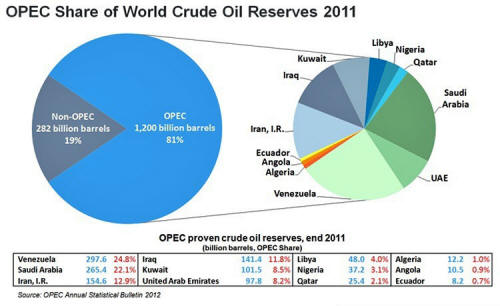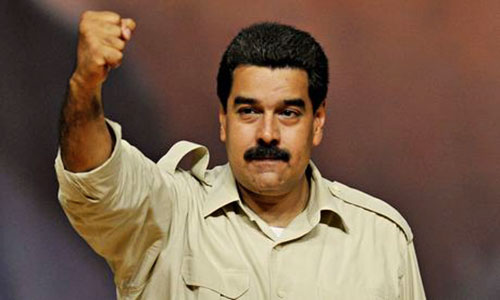
by Jon Queally
staff writer
April 8, 2014
from
CommonDreams Website
United States would like
to "get their hands on [our] oil,"
says leftist leader

Proven Venezuela'
Crude Oil Reserves
Source

Nicolás Maduro has remained
defiant
after months of protests
against his government,
which he describes as 'a revolt of the rich'.
(Photograph: Juan Barreto/AFP/Getty Images)
Venezuela President Nicolas Maduro, in an
exclusive
interview with The Guardian
published Tuesday, says the United States is actively fomenting a 'slow
motion coup' in his country, with the ultimate goal of overthrowing his
democratically elected government as a way to gain more profitable access to
its vast oil resources.
Rejecting the dominate narrative presented by
the U.S. media regarding recent protests in the country, the man who
succeeded Hugo Chavez as president and won re-election last year
said,
"They are trying to sell to the world the
idea that the protests are some of sort of Arab spring. But in
Venezuela, we have already had our spring: our revolution that opened
the door to the 21st century."
Maduro says claims the street protests are at
least partly being fueled by U.S.-backed operatives, and defends this
position by pointing to more than 100 years of history of Washington
interference in Latin America as well as new details contained in files
leaked by NSA whistleblower
Edward Snowden - both of which make clear
what U.S. intentions continue to be towards those who resist the military
and economic dominance of the U.S. and its allies.
"Is 100 years of intervention in Latin
America and the Caribbean not enough: against Haiti, Nicaragua,
Guatemala, Chile, Grenada, Brazil?" he said to the Guardian.
"Is the coup attempt against President
Chávez by the Bush administration not enough? Why does the US have 2,000
military bases in the world? To dominate it. I have told President
Obama: we are not your backyard anymore."
By comparison, Maduro claims that the opposition
forces in his country are following the same model as the U.S.-supported
anti-government protesters that recently overthrew the government of
Ukraine.
Like in Kiev, he explained, the right-wing
opposition in Caracas and elsewhere have tried to,
"increase economic problems through an
economic war to cut the supplies of basic goods and boost an artificial
inflation."
What those protesting the government have tried
to do, Maduro continued, is,
"create social discontent and violence, to
portray a country in flames, which could lead them to justify
international isolation and even foreign intervention."
The Guardian's
Seumas Milne and Jonathan Watts, who conducted the interview,
pressed Maduro on whether or not his government has been overly repressive
against protesters and if political dissent is a punishable offense in
Venezuela.
As they report:
About 2,200 have been arrested (190 or so
are still detained) during two months of unrest, which followed calls by
opposition leaders to "light up the streets with struggle" and
December's municipal elections in which Maduro's supporters' lead over
the opposition increased to 10%.
Responsibility for the deaths
is strongly contested.
Eight of the dead have been confirmed to be
police or security forces; four opposition activists (and one government
supporter) killed by police, for which several police officers have been
arrested; seven were allegedly killed by pro-government colectivo
activists and 13 by opposition supporters at street barricades.
Asked how much responsibility the government
should take for the killings, Maduro responded that 95% of the deaths
were the fault of "rightwing extremist groups" at the barricades, giving
the example of three motorcyclists killed by wire strung across the road
by protesters. He said he has set up a commission to investigate each
case.
The global media was being used to promote a
"virtual reality" of a "student movement being repressed by an
authoritarian government", he argued.
"What government in the world hasn't
committed political or economic mistakes? But does that justify the
burning down of universities or the overthrow of an elected
government?"
The protests, often led by students and
overwhelmingly in well-off areas, have included arson attacks on
government buildings, universities and bus stations.
From a peak of several hundred thousand
people in February, most recent demonstrations have dwindled in size and
are restricted to
opposition strongholds, such as Tachira state on the Colombian
border.
A hardline opposition leader, Leopoldo
López, who participated in the 2002 coup, and two opposition mayors
have been arrested and charged with inciting violence.
Another backer of the protests, María
Corina Machado,
was stripped of her post in parliament.
This was not "criminalizing dissent", Maduro
insisted.
"The opposition has full guarantees and
rights. We have an open democracy.
But if a politician commits a crime,
calls for the overthrow of the legitimate government and uses his
position to block streets, burn universities and public transport,
the courts act."
Critics, however, insist the courts are
politicized.
In the end, Maduro contends that Venezuela
embraces the polarization that its democracy affords.
"Politics is not only for the elite, for
centre-right and centre-left parties, while the elites distribute power
and wealth among themselves," Maduro said.
"Venezuela has a positive polarization
because it is a politicized country where the large majority take sides
over public policies. There is also negative polarization that doesn't
accept the other and wants to eliminate the other - we must get over
that with national dialogue."
As for when he'll step aside and on the
revolutionary legacy of his predecessor Hugo Chavez?
"The people will decide until when I can be
here. Be certain that if it is not me it will be another revolutionary,"
he said. "What will be indefinite is the popular power of the people".


